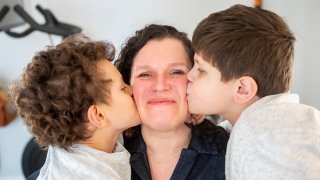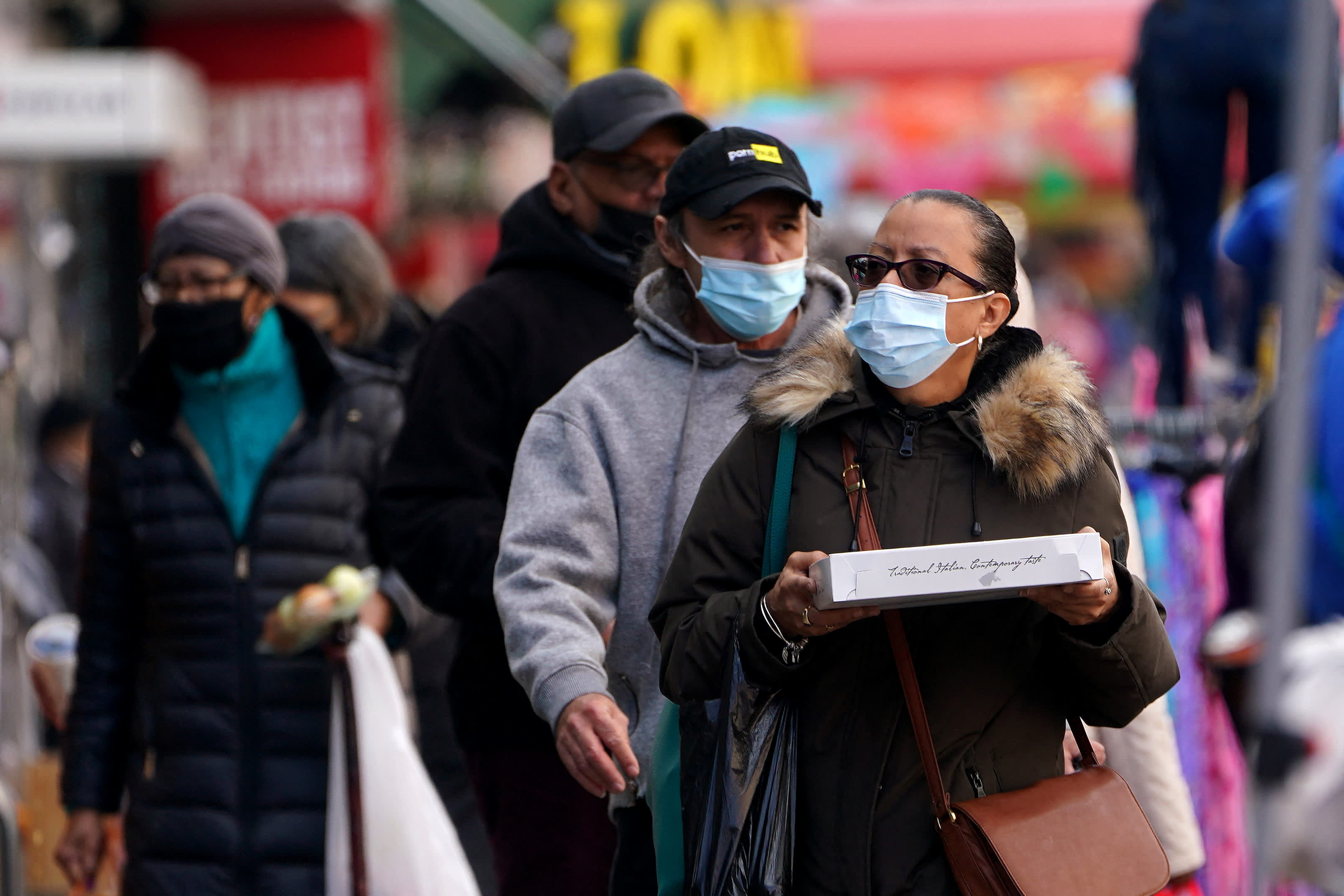
On one evening in July 2022, Casalan Bittle, a 47-year-old single mother from suburban Northbrook, began experiencing indigestion, which she chalked up to a burger eaten the night before.
Bittle put her kids to bed and went to sleep, but ended up waking up a few hours later with nausea. So, she went to the bathroom and tried to vomit.
But that never happened.
"I laid down on the bathroom floor and progressively felt more nauseous and then a little sweaty," she said, recalling the 90 minutes or so she sat down in the bathroom. Bittle tried to get up to take a shower -- but realized she didn't have the strength to get off the floor.
Feeling out of the loop? We'll catch you up on the Chicago news you need to know. Sign up for the weekly Chicago Catch-Up newsletter here.
Suddenly, she started to panic.
Bittle managed to get up, which caused discomfort in her chest and shortness of breath. Somehow, she made it over to her mother, who by chance, was visiting at the time. Then, out of nowhere, the single mother of two became unconscious for five minutes.
Paramedics arrived and rushed Bittle to an area hospital, where doctors revealed startling news - she was having a heart attack.
Health & Wellness
“The last thing I remember — I don’t recommend it — was being defibrillated,” she recalled in an interview with TODAY.com. “I remember being electrocuted alive.”
Bittle wasn't even 50 years old, had no known health conditions and exercised regularly.
She had even climbed Mount Kilamanjaro, and just months prior underwent an annual physical, which included an EKG. Doctors treating the mother determined she had a 100% blockage in the main artery of the heart, which is often referred to as a widow-maker heart attack.
The single mother of two was clinging to life.
The last thing I remember — I don’t recommend it — was being defibrillated. I remember being electrocuted alive.
Casalan Bittle, a mother of two from Northbrook
Doctors intubated her, installed a stent and temporary heart pump and placed her on extracorporeal membrane oxygenation, also called ECMO, which is "the most intense form of life support that somebody can receive," according to Dr. Bow (Ben) Chung, a cardiologist with the University of Chicago Medicine who treated Bittle.
"This was basically about as sick as a person can be, from a heart perspective," he said.
Bittle's family was told to say goodbye and that a heart transplant seemed to be the only option. After experiencing multiple cardiac arrests while hospitalized, doctors were concerned about how much of Bittle's brain function remained intact.
She was put on an emergency transplant list and transported to the University of Chicago Medical Center in hope that a heart would become available.
"Very miraculously, after what I understand to be a lot of craziness, my heart recovered to an extent where (they) thought, 'OK, maybe we don't need a transplant right now. Let's wake her up,'" Bittle said.
Within a few days, she was taken off ECMO and had the heart pump removed, but hit another hurdle: Bittle developed blood clots in both her right and left femoral arteries, which cut off circulation in her leg. She was quickly moved into surgery, where surgeons saved her leg and repaired the arteries.
From there, things got a little quieter as she focused on recovery.
Bittle spent about two weeks in the hospital, followed by six weeks of outpatient rehabilitation and another 18 weeks of cardiac rehabilitation. She also wore a LifeVest, a wearable defibrillator, for 90 days.
In February 2023, she had a noticeably tough day in outpatient rehab.
"It was just a tickle in my chest," she said. "And I went to cardiac rehab and I was walking on the treadmill, and it felt more difficult than it did the day before."
Out of an abundance of caution, her doctor sent her for a stress test. The results were "not overly concerning, but just a little funny," Bittle explained. So, again, out of an abundance of caution, her doctor ordered further testing, which revealed she had a 70% blockage in the main artery.
If not caught, that could have caused another heart attack.
It's not uncommon for people to have a second heart attack after surviving their first, Chung said, but it was unusual for another blockage to develop under these circumstances.

"At that point, she was on all of the right medications ... to prevent another heart attack," he explained.
Instead of having open-heart surgery, doctors offered Bittle the option of robotic cardiac surgery. Unlike open-heart surgery, doctors don't actually have to stop the heart with this approach. Plus, patients can go home within a day or two and resume their normal lives.
Almost a year after her robotic surgery, Bittle is doing "fantastic," she said. "Most days, I would never know."
She still has residual heart damage, takes medication every day and there are some days when she gets winded and needs to take it easy.
"I will be a heart failure patient for the rest of my life, but my recovery is nothing short of remarkable," she said.
One of the biggest reminders of her health journey is the scars that she's left with, but even those have become a source of connection.
Sometimes she compares scars with her son, who had heart surgery at 10 months for a congenital condition.
"We’re both heart warriors," she stated.
In a previous interview with the University of Chicago Medicine, Bittle acknowledged she "survived the unsurvivable."
"...I survived the unsurvivable, right?" she stated. "I have access to extraordinary medical and rehabilitative care. That’s a privilege, and I’m so extremely lucky. And now I’m going to go live a long life.”
Looking back, Bittle wishes she had known just how common heart attacks are in women and that women can present with subtler symptoms than men. Regardless of gender, the most common symptom is chest pain.
According to Chung, a lot of people are hesitant to call something pain. It may present as discomfort, pressure or tightness or appear as a nagging feeling that just won't go away.
"Many women think it has to be, 'I'm clutching my chest and falling down on the ground like you see in the movies,' and it can be much more subtle," Dr. Tara Narula, NBC medical contributor, explained on a Feb. 1, 2024, TODAY show segment.
Other subtle signs that can indicate a heart attack include the unusual indigestion and sudden nausea Bittle experienced, as well as shortness of breath and shooting pain in the jaw, back, arm or shoulder. Women are more likely to develop these easily-missed symptoms than men, Chung explained.
Heart attack symptoms in women can include:
- Chest pain, discomfort, heaviness, tightness or pressure
- Jaw, neck, shoulder or upper back pain
- Nausea, vomiting or indigestion
- Shortness of breath
- Extreme fatigue or fainting
Research shows that women are also significantly more likely than men to die after a heart attack, potentially due to delays in diagnosis and treatment.
The bottom line is that if you're having a symptom that's unusual for you, particularly if it doesn't go away, you should get medical attention, Chung explained.
"You don't have to go to the emergency department, but talking to your primary care doctor or going to an urgent care would probably be the best just to have an evaluation," he said.
As Bittle puts it, "Don't think you're being silly. Get help right away."
Knowing everything she survived, Bittle said she feels a sense of "gratitude and amazement," and doesn't let herself get dragged down by negativity around her.
"It's not worth me spending my energy in a negative place," she explained, "because I've spent all my energy on staying alive."



